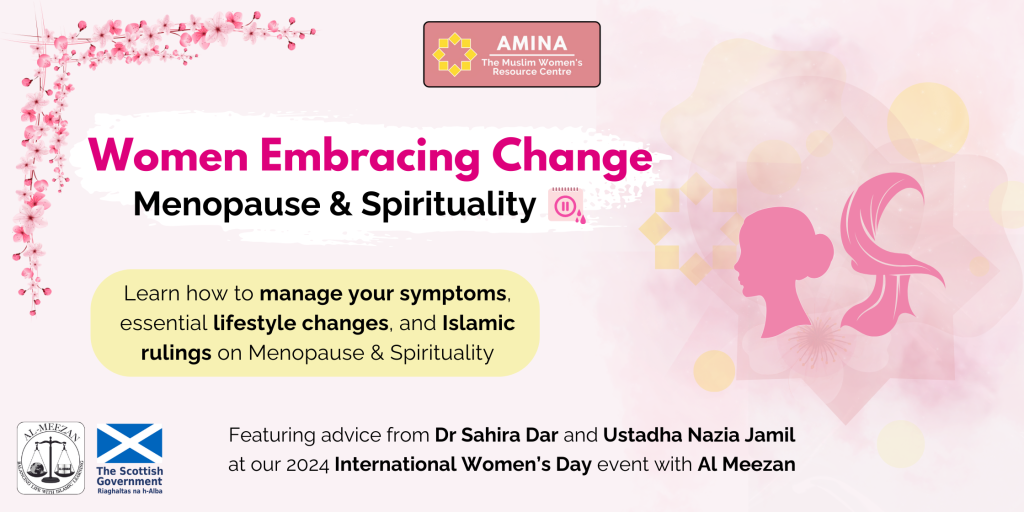
Menstrual Series: Menopause and Spirituality

This Blog focuses on the second of our Menstrual Health workshops – Women Embracing Change: Menopause & Spirituality. The session, held in partnership with Al-Meezan, featured Dr Sahira Dar and Ustadha Nazia Jamil as they explored the medical and spiritual sides of Menopause. As promised, we’ve compiled key information from the event for women who were unable to attend. Learn how to manage your Menopause symptoms, essential lifestyle changes, and Islamic rulings on Menopause and Spirituality.
What is Menopause?
Menopause is the natural phase within a menstruating woman’s life where her body undergoes various biological changes. These symptoms are attributed to hormonal changes as her menstrual cycles end. On average, menopause occurs at the age of 50, although it may happen anywhere between the ages of 45 and 55. Family history helps to determine when you may experience menopause.
There are 3 stages of menopause:
- Perimenopause
- Menopause
- Postmenopause.
Perimenopause
Perimenopause occurs just before menopause begins. It is characterised by several key symptoms, although your monthly period will not have ended. These symptoms include:
- Change in periods
- Hot flashes
- Sleep issues
- Emotional changes
- Vaginal dryness
- Urinary changes
- Decreased sex drive
- Increased risk of other medical conditions, including cardiovascular diseases, bone loss and osteoporosis.
Perimenopause ends once you have not had your period for 12 months. This indicates that you have moved into the next stage – Menopause.
Menopause
The second stage of menopause begins 12 months after a woman’s last period. Having a hysterectomy may induce menopause. The transition through menopause impacts each woman differently. The duration also varies for each woman – it can last anywhere, from a few months to years.
Symptoms of Menopause
Body Changes
During Menopause, a woman’s physical body undergoes several changes, which include:
- Lower Oestrogen Levels:
Oestrogen levels fall during menopause. Oestrogen fulfils many roles, including protecting our bodies from stress and maintaining body tissue. - Changes to Breasts:
The lack of oestrogen often results in a loss of breast tissue, impacting their shape and making them softer. It is important to have your breasts measured and to wear a well-fitted, supportive bra. If you are concerned about changes in your breasts, please consult a medical professional. - Changes in Fat Distribution:
During menopause, fat distribution within the body changes. For many women, this includes body shape changing from a pear-shape to a more apple-like shape. - Loss of Muscle Mass:
Women tend to lose muscle mass during menopause. Muscle mass is essential to being strong and active. To help combat this loss, it is crucial for women to increase their protein intake and exercise. - Weight Gain:
Many women gain weight due to stress, stress hormones, and changes in metabolism. To manage this weight gain, you may need to implement lifestyle changes. - Hair Thinning:
Hair thinning occurs due to the hormonal imbalance throughout this period.
Urinary and Vaginal Symptoms
Women may experience urinary and vaginal issues during menopause. These include:
- Vaginal Dryness:
Many women experience vaginal dryness, which may result in vaginal itching. - Pain during Sex:
Menopausal women may experience pain during sex due to their vaginal dryness, and in some cases, bleeding. - Urinary Incontinence:
Menopause impacts women’s’ ability to control their bladder and urination, making urinary incontinence a common symptom. - Pelvic Prolapse:
Pelvic prolapse is the condition where other organs press against your vagina due to a weakened pelvic support. - Constipation:
Constipation often occurs because of pelvic prolapse. - Yeast Infections:
During menopause, vaginal tissue thins and the lack of oestrogen impacts the natural balance of vaginal flora, which is good bacteria. This leaves women more susceptible to fungal yeast infections. - Pelvic Floor Changes:
Oftentimes, women experience pelvic floor issues during menopause. However, even pelvic floor dysfunction (PFD) is reversable. 90% of the time, PFD is due to a ‘movement issue’. Only 10% of women require medical prescriptions to help reverse it. Many women can correct this through breath work and exercises.
Although 70% of women experience such symptoms, they often go untreated. Women experience embarrassment in speaking about these, and only 10% receive treatment. It is crucial for us to speak up when we experience health issues – shame should not be a factor when it comes to speaking with a medical professional.
Mental Wellbeing
Although all menstruating women experience menopause, it often adversely impacts women’s mental wellbeing. This can be attributed to several reasons:
- Changes to Physical Body or Body Image
- The Fear of Being Classed as “Old” in a Society that Values Youth
- Sleep Disturbance
- Brain Fog and a Lack of Concentration
- Life Events including Ageing Parents, Children Moving Out, or Changes in Professional Life
- Changes in Intimate Relationships
- Past Medical History.
There are several strategies to help manage these symptoms.
Managing Menopause Through Lifestyle
Lifestyle is the foundation of health. Menopause symptoms can be managed to an extent through lifestyle changes. There are several key areas that can be targeted:
Stress Management
Managing stress levels can have a profound impact on menopausal wellbeing. Mindfulness, Breathing Exercises, Yoga, and Pilates are all effective ways to help manage stress.
Nutrition
A key method to manage symptoms is by maintaining a healthy diet. During menopause, your body suffers from nutrient deficiencies, which accentuate symptoms. Essential vitamins and minerals that you may lack include Calcium, Magnesium, Vitamin C, Vitamin D, and Phytonutrients. To naturally include Calcium, consume more leafy green vegetables, dairy, and sardines. To combat the lack of Magnesium, increase your spinach, nuts, and Epsom salt intake. For Vitamin C, peppers, leafy green vegetables, and tomatoes are highly effective, and for Vitamin D, mushrooms, and egg yolks. Finally, to increase your phytonutrients, eat more green vegetables and blueberries.
Exercise
Regular exercise can help you during perimenopause and menopause. A Sedentary (inactive) lifestyle leads to higher risk of symptoms. One key lifestyle change could include going for a walk after dinner, as this helps to decrease your glucose levels. Light strength training and Pilates are also effective forms of exercise for menopausal women. Regular exercise combined with an increased protein intake will help to combat the loss in muscle mass.
Staying Hydrated
During menopause, you must ensure that you are staying hydrated. Drinking water helps to lubricate your joints, manage your body temperature, and combat dryness and discomfort.
Limiting Your Caffeine
Caffeine intake has an adverse impact on your body, often resulting in hot flashes and urinary urgencies. To help manage these symptoms, manage your caffeine intake, and switch to drinking non-caffeinated drinks – or water!
Sleep Hygiene
Improper sleep hygiene can result in digestive issues. Limiting your caffeine can also have a positive impact on your overall sleep.
Pelvic Floor Exercises
Pelvic floor exercises can help to correct any pelvic floor issues that arise. The Squeezy App is very effective in improving pelvic health to overcome such issues!
Active Rest
Ensuring that you are get adequate active rest during menopause is essential as your body needs time to rest and recover.
Managing Your Weight
Being overweight often magnifies menopausal symptoms. To manage symptoms such as hot flashes, try to maintain a healthy weight. For further support on how to do this, please consult a medical professional.
Medication for Menopause
Hormone Replacement Therapy
Hormone Replacement Therapy (HRT) helps to replace a women’s oestrogen and progesterone levels. While not all women need HRT, it can effectively manage symptoms such as hot flashes, low mood, and low libido, while working to protect your heart & bones.
There are various types of HRT, which differ in several ways:
- HRT types may contain different hormones, such as Oestrogen or Progesterone
- They may differ in how they are taken, whether as tablets, spray, vaginal rings, or patches
- HRT also differs by routine as they can be cyclical or continuous.
HRT can result in side effects including nausea and breast tenderness. While taking HRT, you should be aware of possible risk factors, and the role of medical history. To help monitor changes with your body, book an annual medical review while taking HRT.
Non-Hormonal Medication
Non-Hormonal Medication is an alternative to HRT. This medication suits women who cannot or do not wish to take HRT.
Oftentimes, seeing a medical professional can be helpful. Counselling therapy and CBT are two effective techniques that help menopausal women. Massages, reflexology, and shiatsu are also highly effective. Many women use Herbal remedies, however as these are not regulated, they may interfere with medications. Always let your doctor know about any herbal remedies that you use.
Menopause and Spirituality
From an Islamic Perspective, menopause is a stage of life that is written by God for women. Muslims believe that they will be held accountable for all their deeds, good or bad. The menstrual cycle holds great significance in Islam, as it is when a girl’s deeds first begin to be recorded.
Although a woman cannot pray Salaah while on her period, the essence of her Iman remains intact. Knowledge of Islamic rulings are important as they can be implemented in our daily lives; it is important to educate ourselves to tailor our worship toward our menstrual phase and cycle.
Women’s families should make the effort to understand their menstrual cycle or their stage of menopause. As a woman transitions into menopause, her husband or children should support her by helping her implement beneficial lifestyle changes.
Bleeding and Islamic Worship
From an Islamic lens, a woman experiences three types of bleeding:
- Menstrual Blood during the monthly period
- Postnatal Bleeding after childbirth
- Istihada – Irregular/Abnormal Vaginal Bleeding.
Menstrual bleeding is described as a major spiritual impurity, which requires ghusl (full ablution) for a woman to pray salaah, fast, or engage in sexual activity. However, Istihada is only a minor impurity, which invalidates the wudu (partial ablution) but not the ghusl. Therefore, to pray salaah, a woman must only perform wudu in this case.
Ustadha Nazia Jamil highlighted three key points:
Menopausal Bleeding
A woman experiences menopause when she is around 55 lunar years old, which equates to approximately 53 years and 4 months. Any bleeding that occurs after this age, regardless of the colour of the discharge, is classed as Istihada. Only wudu is required to pray salaah during Istihada.
Irregular Bleeding
The Monthly Period lasts between 3-10 days. A 15-day purity span is required to separate 2 instances of bleeding. To better understand whether you have started your next period or are still experiencing symptoms from your previous period, keep track of the date and times when your period starts. This will help you determine whether the bleeding is Najis (impure) or not.
If a woman bleeds for more than 10 days, she should make ghusl (full ablution) and can then return to fasting and praying. However, it is important to make wudu (partial ablution) before each prayer in this instance.
HRT and Ghusl
To perform ghusl, a woman needs to remove her HRT patch. For this reason, Dr Sahira Dar recommended the use of a topical Hormone Replacement Therapy.
Thank you to everyone who attended our Menstrual Wellbeing sessions this year. It was an honour hosting a range of knowledgeable female speakers, to dive into topics that are rarely addressed in Muslim and BME Communities.
Amina MWRC is a Scottish Muslim & BME Women’s Right Organisation. If you or a woman you know needs advice, call our FREE Helpline at 0808 801 0301, Monday – Friday, 10 am – 4 pm. We offer a range of services including Befriending for socially isolated women, Casework for victims of domestic abuse, and a Legal Clinic for women with visa and immigration issues. We offer Employability Support, Financial Advocacy, Creative Wellbeing activities, and Violence Against Women and Girls Campaigns.
To stay updated with our work, follow us on Instagram, Facebook, or Twitter.
Additional Resources

